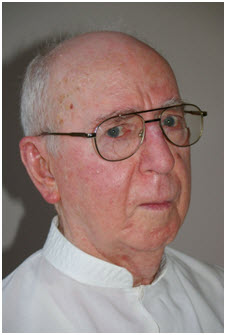The way we were – home to roost
|
|
Fr Patrick Hickey died in Australia on 1 August 2013. This article, which shows a lighter though very practical side of missionary life, first appeared in The Far East, the magazine of the Columbans in Australia and New Zealand, in October 1967 and was posted on the website of the Columbans there in 2009.
The pullet arrived, a gift from a family in the parish. Having no chicken coop, I adopted the practice, followed locally with fighting cocks, of tying one end of a piece of string to the bird and the other to a stake in the ground. At night she was locked in the shed.
After two days of this, our pullet learned where home was and we turned her loose. Each afternoon she returned, promptly at five, stopping by the door of the presbytery for a few minutes until she was noticed, then waiting in the shed for her supper.

She began to lay. We followed her activities with interest and were distressed to notice that, with seven eggs in the nest, she became ill.
We are early risers in the Philippines. The local radio has a programme from 5am to 5.30am sponsored by the producers of a certain brand of poultry medicine. Why not? It could do no harm. We tried it. Two doses were enough: she struggled to her feet and got on with the job.
By now the cook, a lad of about twenty years of age, had decided that his parish priest was interested in poultry. He donated a second pullet. The same procedure was followed, a piece of. string and a stake in the ground. But No. 1 refused to allow her into the shed at night so No. 2 made a place for herself outside the sacristy.
On the same day that No. 1 hatched out her brood, No. 2 began to lay. In a short time we had two families roaming around the place.
It was then that an elderly lady arrived on the scene, a poor woman, with a weak-looking young rooster for sale.
I did not want a rooster, the price was a little high, but the woman needed the money. I bought him, intending to give the nuns a poultry dinner that night. But someone suggested he might be good for breeding so, again, why not?
AS I SAY . . .
Now, with a rooster, two hens and fifteen small chickens about, it was time for the chicken coop.
Everything was fine for a short while. The young rooster was thriving by this time. But what use is a king without subjects? The next step was to buy two hens. Fine! But then one of the schoolboys donated hen No. 5! Things were getting out of hand. There were twenty-one birds of varying ages. And that first family was growing up.
It was difficult to keep track of things at this stage. The first family, now reduced to four, was mixing with the adult birds. The second family, ten of them, was in its own coop. No. 1 was sitting again, No. 3 was sitting, No. 2 was trying to share the nest of No. 4.
Eventually, the third and fourth families were roaming around the church yard and all available hens were laying. Thirty-five birds by this time, with twenty-five eggs yet to be hatched. And it all began with that gift of one pullet. And all in five months!
Father Michael Doyle and Father William Hennessey called in to sample two of the first brood, just eighteen weeks by this time. Delicious!
As I say, I am no chicken farmer!
You may read Fr Hickey’s obituary here.

